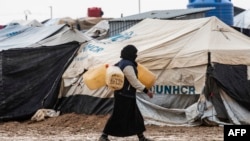Every new death at detention camps in northeastern Syria sparks a new wave of panic that the coronavirus pandemic is about to wreak havoc, leaving some residents to wonder aloud how soon they are going to die.
The sense of desperation and hopelessness comes from those in the camps, many of them family members of dead or captured Islamic State fighters, through accounts shared with various humanitarian groups and compiled by the International Crisis Group.
“It’s hard to breathe,” one woman in the al-Roj camp said in a text, sent to the director of Families Against Violent Extremism, a Canadian organization. ”We have heavy coughs.”
Another woman at the nearby al-Hol camp said there was not enough water for anyone to wash their hands on a regular basis, and that confusion among the camp’s residents is a constant.
“We don’t understand what is going on, so people are scared,” she said.
Crisis group
In other exchanges described by the International Crisis Group, women in the various camps describe long bouts of coughing or express thoughts of suicide.
Given the growing concerns about the coronavirus pandemic, few people can visit the camps. The accounts about life on the inside were shared by social media apps, texts and phone calls.
Still, there are indications that fear of the coronavirus is spreading among captured IS fighters held in a series of make-shift prisons by the U.S.-backed Syrian Democratic Forces (SDF).
Some SDF officials have suggested that a March 30 riot at the prison in al-Hasakah, which holds about 5,000 men, may have been sparked, in part, by talk of the pandemic.
Prisoners who spoke to VOA prior to the riot expressed some measure of desperation.
“Tell us something that gives us just a little hope,” one said.
Concerns about the more than 10,000 IS prisoners and the approximately 70,000 mostly women and children in al-Hol and al-Roj camps are not new. Humanitarian groups had warned for some time that those populations were at high-risk.
“Any areas with large groups of people, such as camps and cities hosting mass gatherings, are of greater concern,” Inas Hamam, of the World Health Organization’s Cairo office, told VOA in February.
At the time, the WHO had already begun working with the United Nations and nongovernmental organizations on preparedness and response plans.
Sufficient efforts
But some Western officials questioned whether such efforts would be sufficient, arguing that illicit communications and exchanges between camp residents with smugglers, IS fighters and even potential contact with Iranian-backed militia members could exacerbate the spread of the virus.
This past Friday, the U.S.-led anti-IS coalition announced it had delivered $1.2 million worth of medical supplies to the autonomous administration in northeast Syria, including latex gloves, masks, surgical kits, defibrillators and oximeters.
Still, those charged with overseeing the detention camps worry that the aid, some destined for hospitals in al-Haskah and Shahdadi, “is not sufficient.”
“We need for thousands in the camps,” Sinam Mohamad, the U.S. representative of the Syrian Democratic Council, told VOA.
Additionally, there are accusations that attempts to determine whether the coronavirus is starting to spread through the detention camps and prisons were rebuffed.
“Damascus has refused to test the samples of suspected corona (virus) which the Autonomous Administration of North and East Syria sent to them for testing,” the Rojava Information Center (RIC), a research organization connected with the SDF, alleged this past week.
The RIC also said doctors in northeast Syria still do not have access to testing machines.
As of April 5, the Syrian government in Damascus had confirmed a total of 19 coronavirus cases, and two deaths.
VOA's Heather Murdock contributed to this report.









